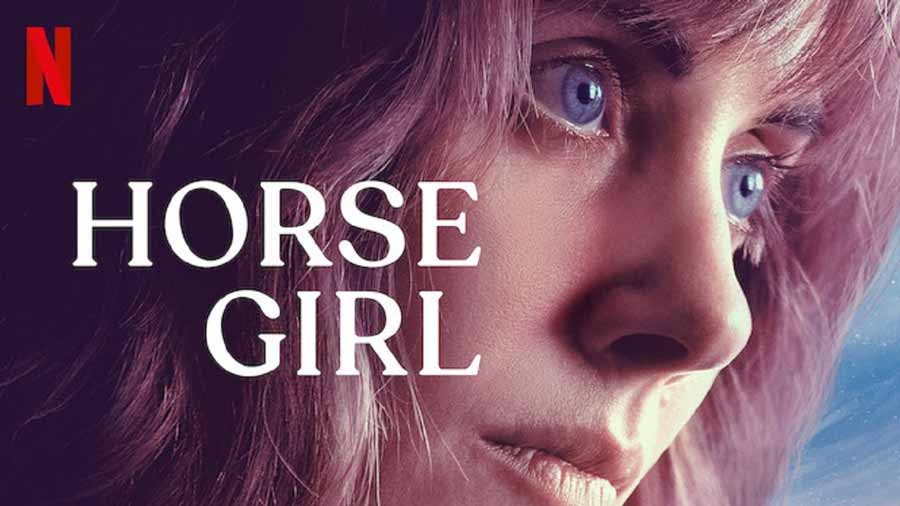
Every day, the various titans of streaming release new original content — some to theaters, some to live solely on the information super highway. STREAM WARRIORS is the Cinepunx family’s ongoing journey to help you navigate the tumultuous and snake-ridden waters of the streaming world.
Alien films strongly feature, well, aliens. Spielberg’s Close Encounters of the Third Kind, for example, follows a man seeking the truth about aliens after witnessing a UFO, while Alien stars a mysterious, violent, and chaotic life form accidentally discovered by the crew of the Nostromo. There are tons of alien films out there, many of which place extraterrestrials at the front and center either as the big-baddie or as a cosmic secret to be uncovered. Some take their place as icons in our sci-fi or horror canons, some are pure entertainment, others fall somewhere in between. But Horse Girl feels different. The film, starring Alison Brie and released by Netflix in February 2020, plays with genre, featuring aliens to some extent but not enough to undoubtedly call it science fiction. Rather, Horse Girl follows a woman struggling with her own experience of reality, the complexity of human emotion, and mental illnesses… with some aliens on the side.

Directed by Jeff Baena (Joshy, The Little Hours) and co-written by Brie, the film spotlights Sarah, an awkward, timid, socially disconnected thirtysomething who finds comfort in supernatural crime dramas, her former horse (emphasis on former), and selling fabric at a local craft store. After her mother’s death, Sarah seeks consolation in her familiar routine, but as the film progresses we find a deeper tension hidden beneath Sarah’s day-to-day coping mechanisms. Slowly, reality seems to slip away as Sarah begins to sleepwalk, wake up to scratches on her apartment wall, and lose time, soon believing she’s been abducted and cloned by aliens. We then learn Sarah’s grandmother lived with and experienced similar hallucinations. The alien abductions in Horse Girl may or may not be a product of Sarah’s mind — that is up to the viewer to decide. What is clear is that the film takes Sarah’s perspective, aliens and all.
The title of the film, Horse Girl, seems straightforward at first. At a glance, Sarah radiates that “horse girl energy” from her obsession with her former horse and her Saddle Club-inspired wardrobe to her dance moves that look a lot like galloping. These idiosyncrasies lead us to believe we are about to step into a quirky dramedy. But quickly, even within the first scene between Sarah and her boss, Joan (Molly Shannon), something feels off. Horse Girl, and the play on this stereotype, speaks more to Sarah’s loneliness, grief, and attachment to the past than to her love of horses. Yes, she loves her horse, but it becomes clear that she returns to the stables seeking the comfort of a life before the loss of her mother among other losses revealed throughout the film.

Between Brie’s stunning performance as a lonely, wide-eyed young woman and the film’s effective editing, it’s difficult not to experience Sarah’s emotions with her. We are along for Sarah’s ride, following her from Great Lengths (the craft store where she works) to her bedroom to an alien dimension in a quick second. Brie’s performance particularly shines in close-up shots, interspersed strategically throughout the film, that help us understand Sarah’s inner life. Brie’s connection to the script (based on her own family history with mental illnesses) shines through and carries the film from beginning to end. With every awkward interaction between Sarah and others, we cringe, just as we feel the panic and paranoia as Sarah unveils this alien presence in her life. There’s a power behind Brie’s performance that is convincing and heartfelt.

Every detail from props, costume design, and dialogue carries monumental meaning, another praiseworthy strength to this film in addition to Brie’s performance. Pieces that seem arbitrary in the first act — such as a piece of peach-colored fabric — become saturated with significance just 30 minutes later. Visually, the film moves like a dream-like amalgam of Sarah’s past, present, and internal world, sharply cutting between flashbacks, daily tasks, and abstract, lucid nightmares. The alien abduction scenes are mostly conceptual and simple in their delivery, capturing the aliens as dark, shadowy figures poking around humans with long fingers in a sterile, white space. But overall, this simple delivery of the aliens points the audience’s attention to the star of this film, Sarah, rather than detracting with over-the-top special effects.

Brie and Baena’s collaboration demonstrates both their creativity and plasticity as writers, and, perhaps even more so, Brie’s fearlessness in writing and performing a story so close to home. Horse Girl presents a variety of compelling elements — from quirky characters to alien encounters to explorations of human psychology and relationships. And although seeming a little scattered at times, the themes of grief and displacement ultimately tie it all together. Rather than focusing on the extraterrestrial, the celestial, or the otherworldly, Horse Girl reveals something fragile, subtle, and ultimately human.




